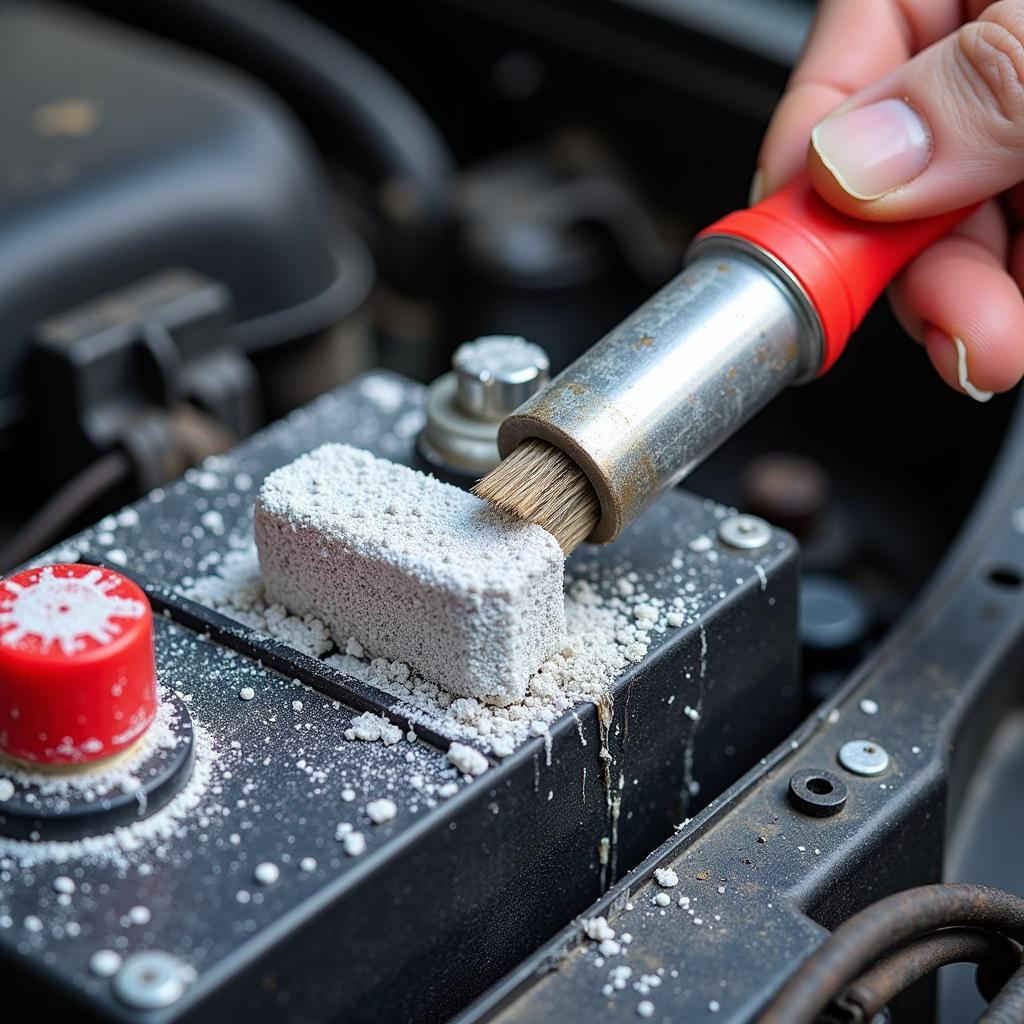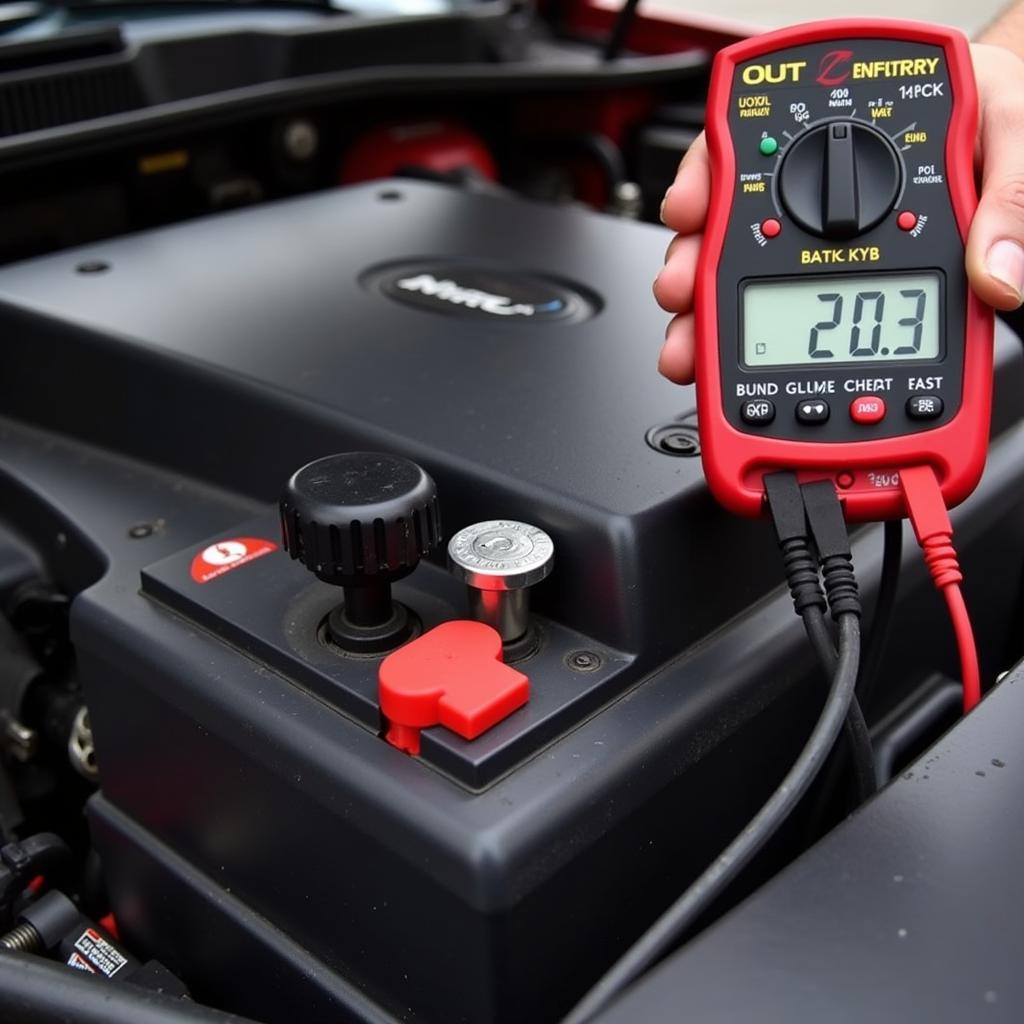Can Car Battery Be Repaired? This is a common question among car owners. While car batteries eventually need replacing, understanding when repair is possible can save you time and money. This article will delve into the intricacies of car battery repair, covering everything from diagnosing problems to exploring repair options and preventative measures.
Repairing a car battery often depends on the type of battery and the nature of the damage. Lead-acid batteries, the most common type, sometimes offer repair possibilities. However, more modern batteries like AGM (Absorbent Glass Mat) or lithium-ion batteries are typically sealed and less amenable to DIY repairs. Knowing the type of battery in your car is the first step. For example, if you are trying to repair a flooded car, the battery is likely one of your concerns, and you can learn more about flood-damaged vehicle repair here: how to repair a flooded car.
Understanding Car Battery Issues
Several issues can plague a car battery, hindering its performance and lifespan. Corrosion on the terminals, a common problem, disrupts the electrical connection and can often be resolved with simple cleaning. Loose connections also contribute to starting problems and are easily rectified. However, internal damage like a shorted cell or sulfation (lead sulfate crystal buildup) often necessitates battery replacement. Knowing how to diagnose these issues is essential.
Diagnosing Battery Problems
Visual inspection is the first step in diagnosing a car battery problem. Look for corrosion, cracks, or bulges in the battery casing. Checking the voltage with a multimeter provides valuable insights into the battery’s health. A fully charged battery typically reads around 12.6 volts. Significantly lower readings indicate a potential problem. You can often repair a car battery at home with the right tools and knowledge. Find out more about at-home car repairs here: can a car be repair at home.
 Inspecting a Car Battery for Corrosion
Inspecting a Car Battery for Corrosion
Common Car Battery Problems and Solutions
Sulfation, a common culprit in battery failure, occurs when lead sulfate crystals build up on the battery plates, reducing their ability to hold a charge. Sometimes, a desulfation process using a specialized charger can revive the battery. However, this isn’t always successful, especially with severely sulfated batteries. If your car’s steering lock malfunctions, you might suspect the battery, though the issue often lies elsewhere. Learn more about steering lock repairs here: can car steering lock can be repair.
Can You Repair a Car Battery Yourself?
Attempting DIY car battery repair can be risky if you’re not familiar with proper procedures. Working with batteries involves handling sulfuric acid, a corrosive substance that requires careful handling. However, simple tasks like cleaning corroded terminals are relatively safe and straightforward. Remember to wear protective gear like gloves and eye protection. You might be wondering if a car battery can be repaired professionally. Explore this topic in more detail here: can you repair a car battery.
When to Replace a Car Battery
Several signs indicate the need for a new battery. Frequent jump-starts, slow engine cranking, dim headlights, and a clicking sound when turning the key are common indicators. A battery that’s more than three years old is also a candidate for replacement. While sometimes a dead battery can be revived, understanding when replacement is necessary saves you from potential roadside breakdowns. If you encounter a breakdown on the road, knowing how to manage the situation is crucial. Learn more about roadside car repairs here: how to pull repair car on the road.
Maintaining Your Car Battery
Proper maintenance can significantly extend your car battery’s lifespan. Regularly cleaning the terminals and ensuring secure connections helps prevent corrosion and electrical issues. Keeping the battery charged, especially during periods of infrequent use, also contributes to its longevity.
 Checking Car Battery Voltage with Multimeter
Checking Car Battery Voltage with Multimeter
“Regular battery maintenance, including cleaning terminals and checking voltage, can significantly extend its life and prevent unexpected failures,” advises John Smith, Senior Automotive Technician at AutoTech Solutions.
“Understanding the type of battery in your car is crucial for determining the appropriate repair or replacement strategy,” adds Jane Doe, Lead Battery Specialist at BatteryCare Experts.
Conclusion
Can car battery be repaired? The answer depends on various factors, including the type of battery, the extent of the damage, and your comfort level with DIY repairs. While some issues can be addressed with simple cleaning or desulfation, others necessitate battery replacement. Regular maintenance and proactive checks can extend the life of your car battery and prevent unexpected failures.
FAQ
- How long does a car battery typically last? (Typically 3-5 years)
- What causes car battery corrosion? (Exposure to moisture and battery acid fumes)
- How can I prevent car battery sulfation? (Keep the battery charged and avoid deep discharges)
- What are the signs of a failing car battery? (Slow cranking, dim lights, clicking sound)
- Can I jump-start a car with a completely dead battery? (Not always, it may require charging)
- Is it safe to repair a car battery myself? (Simple cleaning is safe, but internal repairs can be risky)
- How often should I check my car battery? (At least twice a year)
Need further assistance? Contact us via WhatsApp: +1(641)206-8880, Email: [email protected]. Our customer support team is available 24/7.


